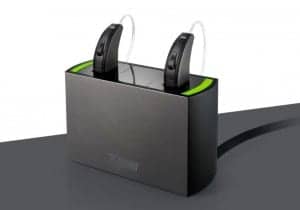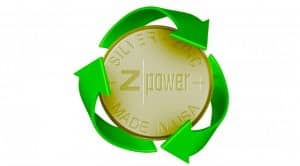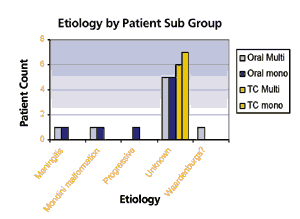Courtesy of ZPower
About Our Expert…
Barry Freeman, PhD, is vice president of business development for ZPower, and has been leader and educator in the global audiology community for over 35 years. Prior to joining ZPower, he was CEO and president of Audiology Consultants Inc (ACI), a private audiology consulting firm, and senior director of Audiology and Education for Starkey Hearing Technologies, a global manufacturer of hearing aids. Dr Freeman has served as chair and professor of Audiology at Nova Southeastern University (NSU) and has taught full time or as an adjunct professor in some of the most distinguished audiology programs in the country. Additionally, he owned and practiced for 20 years at the Center for Audiology in Clarksville, Tenn, and Hearing Services of Kentucky in Hopkinsville, Ky. He is a past president of the American Academy of Audiology (AAA), served on the AAA Board of Directors for 6 years, and continues to serve on several professional boards.
Q & As: This Week’s Top Selections
Q: How long should the battery last after a full charge? How much does Bluetooth activity affect this? —Brent Spehar
A: This is a great and very important question. Battery life is dependent on several factors including the amount of capacity of the battery, how fast the hearing aid drains the current, and the wear behaviors and habits of the user.

Much like how a car’s mileage range depends on its gas tank, the driving conditions, and the owner’s driving habits, a hearing aid’s battery life depends on the capacity of the battery, the wearer’s listening environments, and use of the various hearing aid functions, including audio streaming.
I like to use the example of an automobile. How many gallons of gas does the fuel tank hold or, for hearing aid batteries, how many mAh capacity is in the battery? How many miles per gallon does the car use or how many mA does the battery drain both when streaming and not streaming? And, finally, is the car driven on the highway or in the city and is the air conditioner on or off? Or, for hearing aids, how many hours per day does the hearing aid stream? Does the hearing aid use 2.4 GHz streaming or does it is use NFMI with an intermediate device that has its own battery? And, what features are turned on or off on the hearing aid?
Ask Your Question!
Send your questions to [email protected] or via the comment box below.
Once you answer these questions, you can figure out “how long the battery will last after a full charge.” I gave some example calculations in the HR article: The Changing Landscape of Hearing Aid Batteries (Hearing Review, October 31, 2017).
Please note a factor we have learned in our electronics’ lab. Not all hearing aids are the same. Some 2.4 GHz products have current drains averaging 4.8-5.0 mA when streaming while other 2.4 GHz products using lower power Bluetooth will drain the battery at 3.0-3.4 mA while streaming. Some 2.4 GHz products when not streaming may have battery drains of 1.8-2.0 mA, while some of the newer products with bilateral beam-forming may drain the battery at 2.3-2.5 mA when not streaming.
The key is to know your products and know your patient’s listening habits. This is critical to good counseling.
Q: Is the life of the hearing aid circuit reduced as a result of using the rechargeable system? It did happen when [a previous model of hearing aid] were rechargeable. —Anjan Muhury
A: The ZPower Rechargeable System has been thoroughly evaluated by the hearing aid manufacturers and there is no indication that the system will have a negative effect on the life of the hearing aid circuit. The ZPower silver-zinc battery is designed to mimic the performance of traditional zinc-air batteries and is transparent to the DSP of the hearing aids. Extensive studies of hearing aids using the ZPower System also show the system including the ZPower silver-zinc batteries have no impact on the electrophysiologic performance of the hearing aids. Therefore, the ZPower System will not have a negative impact on the hearing aid circuitry or performance.
Previous Q & A’s
Q: What’s a realistic time frame for a rechargeable hearing aid battery to last?
A: Rechargeable silver-zinc batteries last about a year. They are removeable and therefore easily replaced. It is recommended that rechargeable silver-zinc batteries are replaced once a year by a hearing care professional.
Li-ion batteries are sealed within the hearing aid, and are usually removable only by the hearing aid manufacturer. They last approximately 4 to 5 years.

A: When the hearing aids are put on the charger, the charger will check to see what type of battery is in the hearing aid. If the charger detects a disposable zinc air battery, the lights on the charger will turn red. If the charger detects a silver-zinc battery, the lights on the charger will start blinking green; once the battery is fully charged, the lights will turn solid green.
Q: Can my patients overcharge a ZPower battery if they leave it in the charger for too long?
A: The batteries will not overcharge if left in the charger. It is a best practice to put the hearing aids back on the charger when the hearing aids are not being worn during the day. This will keep the hearing aids turned off and the batteries charged. For long-term storage, if batteries will not be used for over 2 weeks, the rechargeable batteries should be removed from the hearing aids and stored in a location where they will not touch each other or other metal objects.
Q: What happens when the silver-zinc rechargeable battery is getting low on power?
A: The hearing aid wearer will hear the low battery warning. Once the low-battery warning occurs or once a hearing aid shuts off due to a low battery condition, the battery door should not be opened and closed to reboot the hearing aid. Rebooting after the low battery warning can override the smart circuitry in the battery door into believing it has a traditional disposable battery installed and, although the hearing aid will continue to work for a short period, it may over-discharge the battery. If a low-battery warning from the hearing aids is received, the hearing aids should be placed in the charging base for charging or the batteries should be replaced with non-rechargeable batteries. The rechargeable batteries should not be stored with metal objects such as keys or coins.
Q: How often should the batteries be charged?

Q: What happens if the hearing aid wearer forgets to charge the battery at night?
A: They can use a disposable zinc-air battery until it is convenient to re-charge the batteries—ideally the rechargeable batteries should be charged the next night. The rechargeable silver-zinc batteries are a gold color, so they will not be mixed up with zinc-air disposable batteries. The rechargeable batteries should be stored in a safe place and should not be stored with metal objects such as keys or coins.
Ask YOUR Question
Send your questions to [email protected] or via the comment box below.
For more information about ZPower, visit: https://zpowerbattery.com








Does anyone know how long I should leave my hearing aid in the charger it’s othe first night I’ve used my hearing aid and I’m totally confused about how long to leave it on the charger because it says it’s at 100% so should I remove it and put it into the other case for the rest of the night because I would like to get some sleep
Phonak Naida B50-R-CRT hearing aid been ordered. If it is charged each night then say have to go to hospital as an emergency will the hearing aid work if it has not been fully charged i.e. 7 hrs. Also is there any other standby i.e. battery that can be used in this emergency.
Thanks
Question: If a silver-oxide rechargeable battery is fully charged overnight and then removed from the aid and put on the shelf, for how long will it hold its charge and does it discharge slowly or hold full charge till the end of its shelf-life and then die suddenly.
My Z-Power battery last only 11 or 12 hours at most. They have been replaced. At first they last all day but after a few weeks they return to 11 hours or so. The charger seems to be working correctly. I do very little streaming and have even turned off the Bluetooth to conserve power.
I too have z power and they seem to last 15 to 17 hours at first but after two weeks only lasting 10 to 11 hours.
They have been replaced once and the same thing is happening.
Blue tooth is off and they are only used for regular hearing .
I notice there wasn’t a real answer on the daily rechargeable length time just variables babble. The lithium batteries do not seem to have such issues. I sold many Z powers battery & chargers. Wound up changing out RC batteries well before a year. All my blue tooth users went back to disposable batteries because of so many issues with their phones. Support told me to tell my patients to change the charger to another electrical wall outlet in the house to fix charger issues. You can imagine the eyes rolling. I would love to use this product but experienced too many headaches. Hopefully Z power 2 will be more of a smooth sail.